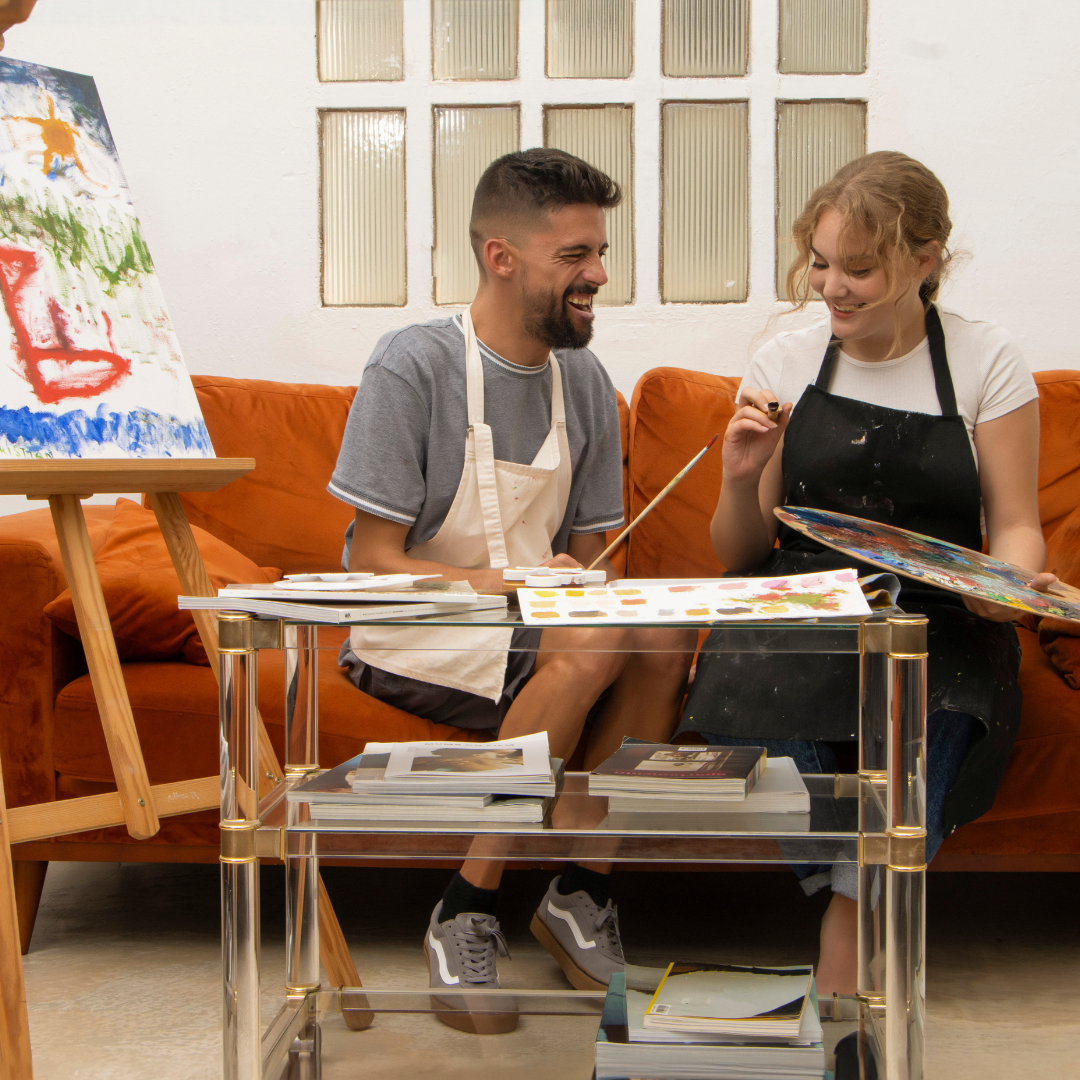Understanding Body Doubling and Allied Health Assistant Support
"They're just lazy."
"If they really wanted to, they'd find a way."
"They need to learn to do things on their own."
We hear these phrases far too often when talking about neurodivergent individuals who struggle with task initiation and executive functioning. At Meaningful Activities, we take a different view: while every situation is unique, we've found that many people who struggle with task initiation aren't lazy or unmotivated, they're working with a brain that needs different support.
The Reality of Executive Functioning Differences
When someone struggles to start or complete tasks, it's rarely about motivation. For neurodivergent individuals—particularly those who are autistic, have ADHD, or experience executive functioning challenges—the brain's ability to initiate, sequence, and sustain action works differently.
For many neurodivergent people, task initiation feels like standing at the base of an impossibly tall mountain. They can see the summit, they want to reach it, and they know what steps they need to take. But their brain can't generate the momentum to start or maintain the energy needed to keep going.
This is where traditional approaches often miss the mark. Telling someone to "just start" or providing detailed instructions doesn't address the neurological reality of what they're experiencing. What they need isn't more information—it's different support.
What Is Body Doubling?
Body doubling is a support strategy where another person is present, either physically or virtually, while you complete a task. The presence of another person provides:
- Gentle accountability: A soft structure that helps maintain focus without stress
- Shared momentum: The other person's activity creates energy that makes it easier to start and continue
- Reduced isolation: Social connection that reduces the overwhelming feeling of facing tasks alone
- External regulation: Support for time awareness, attention, and structured pacing
Body doubling isn't about the other person helping with the task itself. They might be doing something completely different. What matters is their presence and the supportive structure it creates.
How Our Allied Health Assistants Use Body Doubling
At Meaningful Activities, our Allied Health Assistants (AHAs) are trained to provide body doubling and executive functioning supports as part of a neurodiversity-affirming approach. Here's what this looks like in practice:
Body Doubling in Action
An adult participant with ADHD might struggle with maintaining their apartment despite having clear goals around independent living. Previous support workers may have provided cleaning instructions and checklists, but the person already knows how to clean, they just can't generate the momentum to start.
When an AHA sits with the participant during cleaning sessions, bringing their own task to complete, this simple presence can transform the experience. Often, participants begin maintaining their space independently between AHA visits because the supported sessions help them develop their own momentum and routines.
Visual Prompts and Environmental Cues
A teenager with autism might want to develop a morning routine but find that written schedules don't work for them. An AHA can work with them to develop a visual system based on their special interests, perhaps trains, gaming, or another passion.
The morning routine might become a "train schedule" with stations for each task, or a game level progression. The AHA helps create photographs of each area of the routine, creating visual cues that feel meaningful rather than clinical.
Graded Task Approaches
Someone with executive functioning challenges might feel overwhelmed by everyday tasks like grocery shopping. An AHA doesn't just accompany them, they break the experience into manageable components.
First visits might focus solely on entering the shop and identifying one item. Later sessions add selecting products, then comparing prices, then navigating checkout. Each step is graded to the person's comfort level, with quiet presence and encouragement rather than taking over.
The Neurodiversity-Affirming Difference
What makes our approach different:
- We don't pathologise differences: Executive functioning challenges aren't character flaws. They're neurological differences requiring different support strategies.
- We build with you, not for you: Our OTs and AHAs work collaboratively to identify what actually helps, rather than imposing standardised interventions.
- We focus on sustainable strategies: Body doubling and executive functioning supports aren't meant to create dependency. They're scaffolds that help you develop your own systems that work for your brain.
- We celebrate authenticity: Our goal is never to make you appear neurotypical. It's to help you accomplish things that matter to you in authentic ways.
How OTs and AHAs Work Together
Our Allied Health Assistants don't work in isolation, they're guided by our occupational therapists:
OT assessment and planning: Your occupational therapist conducts assessments to understand your unique profile, goals, and support needs. They develop individualised strategies tailored to how your brain works.
AHA implementation: Your AHA puts these strategies into action in your everyday environments, using techniques like body doubling, visual prompting, and graded task approaches.
Regular collaboration: Your OT and AHA meet regularly to discuss progress, adjust strategies, and ensure effective support.
Responsive adjustments: As you develop new skills or encounter new challenges, your team adapts quickly.
Common Situations Where AHAs Provide Support
Body doubling and executive functioning support prove valuable for:
- Task initiation: Starting household tasks, personal care routines, work assignments, or creative projects
- Sustained attention: Maintaining focus during longer activities like studying or organising
- Transitioning between activities: Moving from one task to another
- Novel situations: Trying new activities or accessing community spaces where unfamiliarity creates additional demands
- Routine maintenance: Keeping up with daily living tasks that require consistent follow-through
- Social situations: Navigating group activities where social processing competes with other executive functions
What Body Doubling Isn't
It's not someone doing tasks for you: Our AHAs provide presence and structure, not task completion.
It's not creating dependency: Appropriate scaffolding builds independence. Once you've experienced sustainable task completion with support, you can often recreate that feeling independently.
It's not one-size-fits-all: What works for one person might not work for another. Some people need visible, active body doubling. Others prefer parallel activity. Our approach is always individualised.
It's not forever: Many people use AHA support intensively during skill-building periods, then transition to independent function or less frequent support.
How to Access AHA Support
If you're an NDIS participant wondering whether body doubling and AHA support might help:
Talk to your Support Coordinator: Discuss whether AHA support might be appropriate for your goals and how it could fit within your plan.
Connect with us: Our team can help you understand whether this approach aligns with your needs and what it might look like in your daily routine.
OT assessment: An occupational therapist conducts a comprehensive assessment to understand your profile and develop an individualised support plan.
Trial and adjust: We typically recommend trial sessions to see how you respond to different support strategies.
Moving Beyond the Laziness Narrative
The most important shift we can make is moving beyond the harmful narrative of laziness or insufficient willpower. These judgements don't help: they add shame to an already challenging situation.
When we recognise that executive functioning challenges are neurological realities requiring appropriate support, we open possibilities for genuine progress. Body doubling and the supports our AHAs provide aren't accommodations that enable helplessness, they're supports that enable capability.
We don't tell someone with mobility differences to "try harder" to climb stairs. We provide ramps and elevators. Executive functioning supports work the same way, they provide access to task completion and goal achievement.
What Success Looks Like
Success doesn't mean you never need support. It means you develop sustainable strategies, understand your patterns and needs, and know how to access appropriate support when needed.
Success looks like:
- Completing tasks that previously felt impossible
- Developing confidence in your capability
- Understanding what supports help you thrive
- Advocating for your needs in various environments
- Reducing shame around executive functioning differences
- Building routines that work with your brain
- Accessing community, employment, education, and meaningful activities with appropriate support
Ready to Explore AHA Support?
If you've been called lazy when you know that's not the truth, we'd love to talk with you about how Allied Health Assistant support might help.
At Meaningful Activities, we specialise in neurodiversity-affirming approaches that recognise executive functioning differences as requiring different supports, not correction.
Contact us directly, or ask your Support Coordinator about incorporating body doubling and AHA support into your plan. We're here to support you in accomplishing things that matter to you, in ways that work for how your brain actually functions.
Because you're not lazy. You're not unmotivated. You're unsupported—and that's something we can change together.
Meaningful Activities is an Adelaide-based occupational therapy practice specialising in neurodiversity-affirming support for NDIS participants. Our team of occupational therapists and Allied Health Assistants provides collaborative, client-led therapy that celebrates your authentic self. Contact us to learn more about how we can support your journey.
Take the first step
Book an initial consultation with our team and start your journey towards growth and independence.




